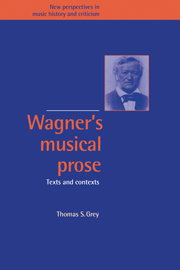Book contents
- Frontmatter
- Contents
- Preface
- 1 Wagner and the problematics of “absolute music” in the nineteenth century
- 2 Beethoven reception and the hermeneutic impulse: “poetic ideas” and new forms
- 3 Engendering music drama: Opera and Drama and its metaphors
- 4 The “poetic-musical period” and the “evolution” of Wagnerian form
- 5 Endless melodies
- 6 Motives and motivations: leitmotif and “symphonic” drama
- Appendix 1 The “poetic-musical period” (from Opera and Drama, Part III, section 3)
- Appendix 2 Principal writings of Richard Wagner cited in the text
- Bibliography
- Index
1 - Wagner and the problematics of “absolute music” in the nineteenth century
Published online by Cambridge University Press: 22 September 2009
- Frontmatter
- Contents
- Preface
- 1 Wagner and the problematics of “absolute music” in the nineteenth century
- 2 Beethoven reception and the hermeneutic impulse: “poetic ideas” and new forms
- 3 Engendering music drama: Opera and Drama and its metaphors
- 4 The “poetic-musical period” and the “evolution” of Wagnerian form
- 5 Endless melodies
- 6 Motives and motivations: leitmotif and “symphonic” drama
- Appendix 1 The “poetic-musical period” (from Opera and Drama, Part III, section 3)
- Appendix 2 Principal writings of Richard Wagner cited in the text
- Bibliography
- Index
Summary
Ideas of absolute music
“The advocates of an absolute music obviously don't know what they're talking about,” Wagner insisted, somewhat petulantly, in 1857 (the open letter “On Franz Liszt's Symphonic Poems”), three years after the appearance of Eduard Hanslick's immediately influential brochure on the subject (V, 191). Perhaps Wagner felt justified in issuing such a summary dismissal of Hanslick's Vom Musikalisch-Schönen (“On the Beautiful in Music”) and its perceived thesis – the advocacy of “absolute music” –on the grounds of intellectual property, since the phrase appears to have its origins in his own writings rather than with Hanslick. Wagner, it seems, coined the phrase “absolute music” in the course of a programmatic commentary he had devised to accompany his performances of Beethoven's Ninth Symphony for the Dresden Palm Sunday concerts of 1846, foreshadowing his famous historical-philosophical reading of this crucial work in the postrevolutionary “Zurich writings” of 1849–51, particularly The Art-Work of the Future. (The seemingly casual reference to “absolute music” in the 1846 commentary would multiply at an alarming rate, like Wagner's prose itself, and undergo manifold mutations in the works to follow.) In claiming, in the 1846 commentary on the Ninth, that the instrumental recitative of Beethoven's finale seemed intent on “transgressing the boundaries of absolute music” (II, 61), Wagner was in fact expressing what was already becoming a widespread critical conviction regarding all of Beethoven's later works and the telos of his oeuvre as a whole (see chapter 2).
- Type
- Chapter
- Information
- Wagner's Musical ProseTexts and Contexts, pp. 1 - 50Publisher: Cambridge University PressPrint publication year: 1995

